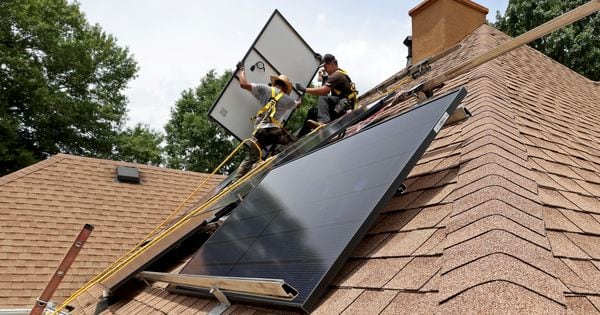Georgia program gets $156M from feds to increase access to solar power
October 2, 2024

“The climate crisis is one of the most urgent and significant challenges that we face in America,” he said.
Flanked by leaders in the clean energy industry, Dickens announced a massive chunk of federal money, $156 million, coming to Georgia to help increase access to solar power for Atlanta’s low-income residents.
Atlanta is one of three cities in the state that will benefit from the funds doled out through a renewable energy initiative tucked within the Inflation Reduction Act passed by Congress and signed into law by President Joe Biden in 2022.
In total, the Environmental Protection Division announced $7 billion in “Solar for All” grants to 60 applications across the country, as part of a $27 billion pot aimed at reducing greenhouse gas emissions.
“Even though studies show that lower income and disadvantaged Georgians are often burdened with extremely high energy bills,” Dickens said, “the startup cost of converting to solar can also be out of reach.”
The money was awarded to the Providence, Rhode Island-based Capital Good Fund, a nonprofit community development financial institution that launched a program called Georgia BRIGHT that leases solar panels and battery storage to residents.
Throughout the first year of the pilot program, the nonprofit installed solar systems for 65 families, reducing their combined energy costs by about $16,000 a year.
“That means, over the course of the 25-year warranty for the solar panels, they’ll offset those homeowners’ utility bills, collectively by more than half a million dollars,” said Seth Gunning, CEO of Sunpath Solar, the vendor chosen to install panels as part of the program.
Georgia is in the top 10 states for solar capacity, according to a leading industry association, but that’s mostly large-scale solar farms owned by utilities, not rooftop panels on homes or businesses.
Rooftop solar has struggled to take off although experts say, when installed, it can cut utility bills anywhere from 50-70%. But access to the renewable energy option could be the difference between life and death for residents who rely on medical devices.
Aisha Bussey, Chief Business Officer for Capital Good Fund, said one resident in the program told her that he slept calmly throughout the night as Hurricane Helene hit Atlanta, because the solar panels kept his sleep apnea machine running.
“This is just one powerful example of how we are and plan to continue to make real strides forward and to impact Georgia,” she said.
The Vicars Community Center — just off Cascade Avenue near the West End — is also benefiting from solar panel installation made possible through the Inflation Reduction Act. The facility is now a first-of-its-kind climate resiliency hub for the area, where residents can seek shelter and charge their devices during emergencies.
Search
RECENT PRESS RELEASES
Related Post



